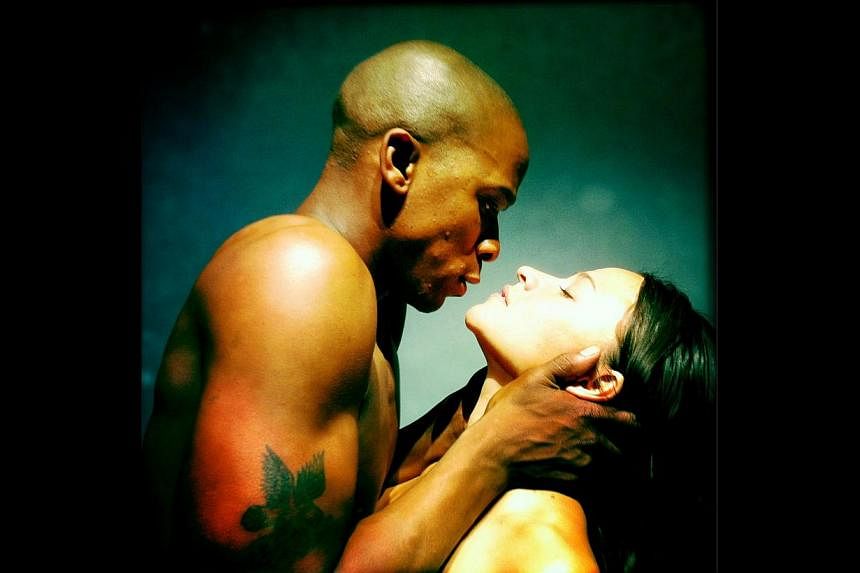See the ragged, beating heart of South Africa ripped out and laid bare on stage in Mies Julie, a blazing modern adaptation of Swedish playwright August Strindberg's 19th-century classic.
Two years after a sensational premiere at the Edinburgh Festival Fringe, the play will open here at the DBS Arts Centre on Aug 27. It is produced by the Baxter Theatre Centre at the University of Cape Town in association with the South African State Theatre and presented here by the Singapore Repertory Theatre.
While Strindberg's original was set more than a century ago in Europe, South African writer-director Yael Farber transports the audience to the present, in the semi-desert Karoo region of her country.
On Freedom Day, which marks the anniversary of the first democratic election held in 1994, the white daughter of a farmer, Miss Julie, gets swept up in a battle of words and worlds with black family servant John.
The original Miss Julie was about the relationship between the daughter of an aristocrat and her married manservant. It was scandalous at the time because of its unflinching take on class tensions, adultery and its sexually explicit nature, but Farber's handling of the play trains a spotlight on the fault lines of race in contemporary South African society.
In Mies Julie - "Mies" is Afrikaans for Miss, the language an offshoot of Dutch spoken in South Africa - the insidious ghost of apartheid, conflicts over land ownership and other frictions are steeped in a cauldron of raw sexuality, which eventually boils over with catastrophic results.
Apartheid, a system of racial segregation which was enforced through legislation, officially ended in 1994. However, its aftershocks still rock South African society two decades later.
Farber, who was born in South Africa in the 1970s, is now based in Montreal, Canada. She wanted the characters in Mies Julie to "say everything to each other that they wanted to say".
"I think that with a place with such a traumatic past like South Africa, once you open up a chapter, there's almost too much to be said. People are just trying to get on with building the future of the country," she tells Life! in a telephone interview.
"Of course, there will be political correctness and many preoccupations in a society going forward, but I'm a great believer that one has to acknowledge the past to overcome it."
One issue which Farber wanted to explore in her adaptation is the idea of land ownership and its distribution as the majority of agricultural land is still in the hands of the white minority.
She says: "With the text, I wanted to look into addressing who owns the land. But how do you go back and address this question when people across the country are so invested in the land?"
Farber is also interested in exploring the role of the black domestic worker in South African society. In Mies Julie, the character of Christine, who was John's wife in Strindberg's original, is now John's mother and Miss Julie's caregiver since the latter was young.
Farber says: "It's interesting because a huge percentage of females work as domestic workers and give a mother's love to the white children that they look after and have to leave their own children to be taken care of by relatives. There are issues of mothers who are missing from their children's lives, to look after others, in this case, Miss Julie."
Mies Julie and John are played by South African actors Hilda Cronje and Bongile Mantsai respectively, while Thoko Ntshinga plays Christine.
The verbal sparring and heightened tension between John and Miss Julie eventually culminates in wild, boundary-breaking sex right there on the kitchen table. The production is rated R18 here for mature themes, sex and nudity.
Reviewer Charles Spencer of The Telegraph called the sexual act "the most graphic and abandoned I have ever seen in a theatre", but noted that it "seems to encapsulate all the anger, frustration and violence that still simmer in South Africa".
The New York Times' Ben Brantley wrote in November 2012: "There is more erotic heat generated by the play's two central characters... than in any production in town. But this is a fire that chills as it destroys."
Farber says that their fornication is "a catalyst to strip away the social limits that these people have with each other, so once that line is crossed, anything can happen. Once you've opened that door, a lot of stuff comes out of the box".
While Mies Julie is a testament to the scars that South Africa still bears from apartheid, Farber says that to her, South Africa will always be home. She left Johannesburg for Montreal in 2005 to be with her partner.
The director says reflectively: "South Africa is an extraordinary country because there's beauty and potential and an honesty and straightforwardness that come from people who have endured many, many things in their history... who are determined to survive."


